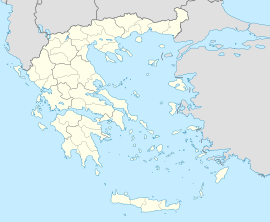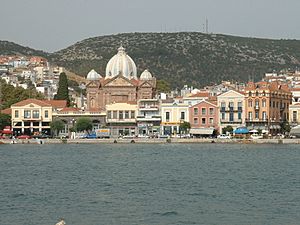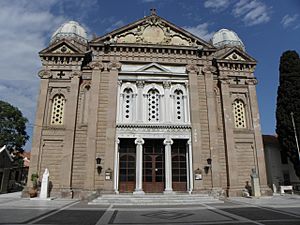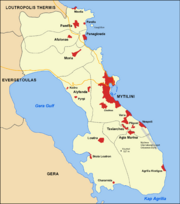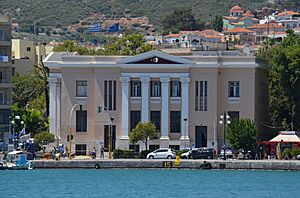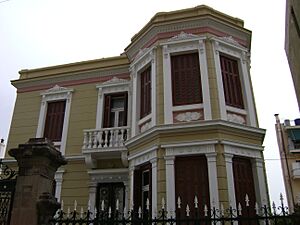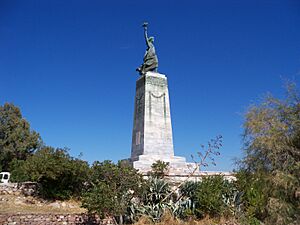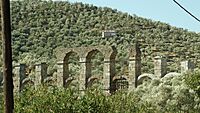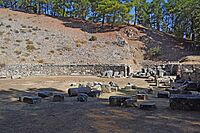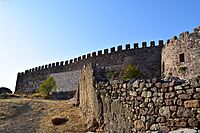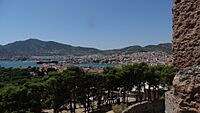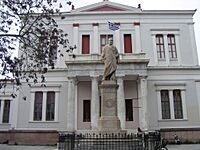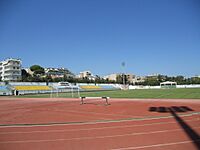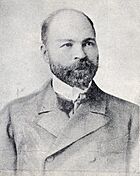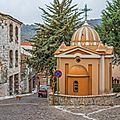Mytilene facts for kids
Quick facts for kids
Mytilene
Μυτιλήνη
|
|
|---|---|
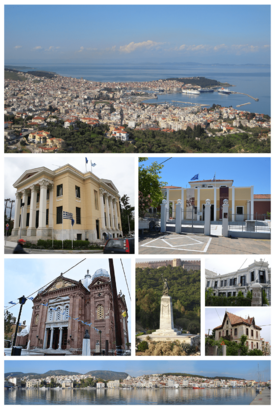 Clockwise from top: Panoramic view of the City of Mytilene, Archaeological Museum of Mytilene, Statue of Liberty, Characteristic samples of urban architecture, the seafront and Harbor of Mytilene, Church of Saint Therapon, and Lesbos Regional Unit Administration.
|
|
| Country | Greece |
| Administrative region | North Aegean |
| Regional unit | Lesbos |
| Municipality | Mytilene |
| Area | |
| • Municipality | 566.7 km2 (218.8 sq mi) |
| • Municipal unit | 107.46 km2 (41.49 sq mi) |
| Elevation | 8 m (26 ft) |
| Population
(2021)
|
|
| • Municipality | 59,034 |
| • Municipality density | 104.172/km2 (269.803/sq mi) |
| • Municipal unit | 41,379 |
| • Municipal unit density | 385.064/km2 (997.31/sq mi) |
| Demonym(s) | Mytilenian |
| Community | |
| • Population | 33,523 (2021) |
| Time zone | UTC+2 (EET) |
| • Summer (DST) | UTC+3 (EEST) |
| Postal code |
811 00
|
| Area code(s) | 22510 |
| Vehicle registration | MY |
| Website | https://welcometolesvos.com/el/ekserevniste-ti-lesvo/ |
Mytilene (pronounced mi-ti-LEE-nee) is the main city and port of the Greek island of Lesbos. It's also the capital of the North Aegean Region. The city is home to the main campus of the University of the Aegean. Mytilene was first built around 1100 BC.
Today, Mytilene is one of two main areas (called municipalities) on Lesbos island. The other is West Lesbos. Mytilene is located on the southeast side of the island. It is also an important religious center for the Eastern Orthodox Church.
Contents
- History of Mytilene
- Geography and Climate
- Population Growth
- City Areas and Streets
- Economy and Trade
- Famous Buildings and Sights
- Archaeological Discoveries
- Education in Mytilene
- Refugee Camps
- Sports Teams
- Media in Mytilene
- Famous People from Mytilene
- Sister Cities
- Consulates
- Images for kids
- See also
History of Mytilene

Long ago, Mytilene was built on a small island near the coast. This island later connected to Lesbos, creating two harbors. These harbors were linked by a channel about 700 meters long and 30 meters wide. Ancient writers said there were white stone bridges connecting the two sides.
Warships called triremes, which had three rows of rowers, could pass through this channel. Over time, the channel filled up with dirt and was also changed by people building the Castle of Mytilene. Eventually, the channel disappeared.
Mytilene became a very important city on Lesbos in the 7th century BC. It was known for its rich land and trade. Famous people from Mytilene include the poets Sappho and Alcaeus. Also, Pittacus, one of the Seven Sages of Greece, was from here. The city was also known for making many coins from a metal called electrum.
In 428 BC, Mytilene rebelled against Athens. An Athenian army defeated the city. At first, the Athenians voted to kill all the men and sell the women and children into slavery. But the next day, they changed their minds! A fast ship quickly sailed to Mytilene to stop the massacre. However, a thousand citizens were still executed for their part in the rebellion.
The famous philosopher Aristotle lived in Mytilene for two years (337–335 BC). He stayed with his friend Theophrastus, who was from the island. This was after Aristotle had been the teacher of Alexander the Great.
In 81 BC, the Romans, including a young Julius Caesar, captured Mytilene. Even though Mytilene supported the losing side in many wars, its leaders managed to convince Rome they were loyal. So, the city did well during Roman times.
In AD 56, Paul the Apostle and his friends briefly stopped in Mytilene during Paul's third missionary trip. They sailed from Assos and then continued to Chios.
A famous ancient novel called Daphnis and Chloe is set in the countryside around Mytilene.
Many important people lived in Mytilene throughout history. These include Zacharias Rhetor, a scholar and bishop in the 5th and 6th centuries. Also, in the 9th century, three Byzantine saints who were brothers lived here: Archbishop George, Symeon Stylites, and David the Monk.
Later, in the Middle Ages, Mytilene was part of the Byzantine Empire. It was taken over by different groups, including the Seljuqs and the Genoese. In 1355, the Byzantine emperor gave the island to a Genoese adventurer named Francesco I Gattilusio. His family ruled Mytilene for over a hundred years.
In 1462, the Ottoman sultan Mehmed the Conqueror captured Mytilene. The city remained under Ottoman rule for many centuries.
In 1690, a naval battle called the Battle of Mytilene took place off the coast. Venetian ships fought against Ottoman and Barbary ships, and the Venetians won.
Mytilene and the rest of Lesbos stayed under Ottoman control until 1912. During the First Balkan War, the Kingdom of Greece captured the island in November 1912.
Geography and Climate
Mytilene is located on the southeast side of Lesbos island. It's north and east of the Bay of Gera. The area of Mytilene is about 107.46 square kilometers. In 2021, it had a population of 41,379 people. This makes it the most crowded part of Lesbos. Other nearby towns include Loutrá, Pámfila, and Mória.
The Greek National Road 36 connects Mytilene with Kalloni. Farmlands are around Mytilene, and mountains are to the west and north. The Mytilene International Airport is just a few kilometers south of the city.
Parts of Mytilene Municipality
The Mytilene municipality was created in 2019. It includes six main areas:
- Agiasos
- Evergetoulas
- Gera
- Loutropoli Thermis
- Mytilene
- Plomari
The Mytilene area itself is divided into smaller communities:
- Afalonas
- Agia Marina
- Alyfanta
- Loutra
- Moria
- Mytilene
- Pamfila
- Panagiouda
- Taxiarches
Climate in Mytilene
Mytilene has a Mediterranean climate. This means it has hot, dry summers and cool, rainy winters.
| Climate data for Mytilene | |||||||||||||
|---|---|---|---|---|---|---|---|---|---|---|---|---|---|
| Month | Jan | Feb | Mar | Apr | May | Jun | Jul | Aug | Sep | Oct | Nov | Dec | Year |
| Record high °C (°F) | 20.2 (68.4) |
21.3 (70.3) |
28.0 (82.4) |
31.0 (87.8) |
35.0 (95.0) |
40.0 (104.0) |
39.5 (103.1) |
38.2 (100.8) |
36.2 (97.2) |
30.8 (87.4) |
27.0 (80.6) |
22.5 (72.5) |
40.0 (104.0) |
| Mean daily maximum °C (°F) | 12.6 (54.7) |
14.7 (58.5) |
16.0 (60.8) |
20.1 (68.2) |
25.0 (77.0) |
28.9 (84.0) |
31.8 (89.2) |
32.1 (89.8) |
27.8 (82.0) |
22.8 (73.0) |
18.8 (65.8) |
13.4 (56.1) |
22.0 (71.6) |
| Daily mean °C (°F) | 9.9 (49.8) |
11.3 (52.3) |
12.2 (54.0) |
16.1 (61.0) |
20.2 (68.4) |
24.4 (75.9) |
27.0 (80.6) |
27.0 (80.6) |
23.1 (73.6) |
19.3 (66.7) |
14.9 (58.8) |
11.9 (53.4) |
17.6 (63.7) |
| Mean daily minimum °C (°F) | 7.2 (45.0) |
7.9 (46.2) |
8.4 (47.1) |
12.1 (53.8) |
15.4 (59.7) |
19.9 (67.8) |
22.2 (72.0) |
21.9 (71.4) |
18.4 (65.1) |
15.8 (60.4) |
11.0 (51.8) |
10.4 (50.7) |
14.2 (57.6) |
| Record low °C (°F) | −4.4 (24.1) |
−3.0 (26.6) |
−1.2 (29.8) |
4.0 (39.2) |
8.4 (47.1) |
11.0 (51.8) |
15.8 (60.4) |
16.3 (61.3) |
10.9 (51.6) |
5.2 (41.4) |
1.4 (34.5) |
−1.4 (29.5) |
−4.4 (24.1) |
| Average precipitation mm (inches) | 129.9 (5.11) |
97.2 (3.83) |
75.1 (2.96) |
46.8 (1.84) |
21.2 (0.83) |
6.0 (0.24) |
2.3 (0.09) |
4.1 (0.16) |
10.7 (0.42) |
38.2 (1.50) |
93.7 (3.69) |
145.4 (5.72) |
670.6 (26.40) |
| Average precipitation days (≥ 1.0 mm) | 9.0 | 8.1 | 6.5 | 4.8 | 2.7 | 0.8 | 0.4 | 0.4 | 1.3 | 3.3 | 6.8 | 10.0 | 54.1 |
| Average relative humidity (%) | 71.0 | 69.8 | 57.5 | 63.9 | 62.6 | 57.3 | 56.0 | 57.4 | 59.5 | 66.1 | 71.0 | 72.0 | 64.5 |
| Source 1: https://meteosearch.meteo.gr/data/list-station-files720.cfm | |||||||||||||
| Source 2: NOAA | |||||||||||||
Population Growth
| Year | Town population | Municipality population |
|---|---|---|
| 1981 | 24,991 | – |
| 1991 | 23,971 | 33,157 |
| 2001 | 27,247 | 36,196 |
| 2011 | 29,656 | 37,890 |
| 2021 | 33,523 | 59,034 |
City Areas and Streets
Mytilene is divided into several districts, each with its own character. Some of these include:
- Agorá
- Chalikas (upper and lower)
- Chrisomallousa
- Epano Skala
- Kallithea
- Kamares
- Ladadika
- Lagada
- Pyrgélia
- Sourada
- Lazaretto/Vounaraki
The city also has many important streets, such as:
- Ermou Street
- Kavetsou St
- El. Venizelou St
- Elyti St
- Kountourioti St
- Theofrastou St
- Vernardaki St
- Vournazon St
- Eftalioti St
- Myrivili St
Economy and Trade

Mytilene has a busy port. Ferries connect it to nearby islands like Lemnos and Chios. You can also take a ferry to Turkey, to cities like Ayvalık and sometimes Dikili. The port also has routes to mainland Greece, including Piraeus (near Athens) and Thessaloniki.
The city is famous for producing ouzo, a popular Greek drink. There are more than 15 companies on the island that make ouzo.
Mytilene also exports other local products. These include sardines caught from the Bay of Kalloni, olive oil, and a special cheese called Ladotyri Mytilinis. Woodwork is another important export.
Famous Buildings and Sights
Mytilene has many beautiful buildings in the neoclassical style. These include government buildings, old city halls, and many grand houses and hotels.
The Baroque church of Saint Therapon is a very impressive building at the port.
Other important landmarks and sights in Mytilene are:
- Ancient Theatre of Mytilene
- Archaeological Museum of Mytilene
- Castle of Mytilene
- Church of Saint Symeon, Mytilene
- Catholic Church of Theotokos, which holds some relics of Saint Valentine
- Çarşı Hamam (an old public bath)
- Ecclesiastical Byzantine Museum of Mytilene
- Folk Art Museum of Mytilene
- Monastery of Agios Raphael
- Museum of Costume and Embroidery of Lesvos
- Sappho Square, with a statue of the ancient Greek poet Sappho
- Statue of Liberty (Mytilene)
- Theofilos Museum
- Yeni Mosque, Mytilene
- Valide Mosque, Mytilene
- The Roman aqueduct of Mória
- Teriade Meseum
- Agora of Ermou street
- Stoa of Mytilene, an ancient Greek building in the Epano Skala area
Archaeological Discoveries
People started exploring Mytilene's ancient sites in the late 1800s. More serious digs began after World War I. In the 1920s, a large part of the famous ancient theater was uncovered. This theater was so impressive that it inspired Pompey's theater in Rome! Later, parts of the theater were even changed to be a gladiatorial arena.
Many discoveries show that Mytilene was built in a grid pattern, just as an ancient Roman architect had described.
Between 1984 and 1994, archaeologists found a hidden sanctuary dedicated to the goddesses Demeter and Kore inside the Castle of Mytilene. They found many oil lamps, clay figures, and animal bones from sacrifices. They also found the burial chapel of the Gattelusi family, who ruled the area in the Middle Ages.
Near the North Harbor, archaeologists found remains from many different time periods. These included an Ottoman cemetery and a large Roman building that might have been a tavern. They also found parts of the ancient city wall. The North Harbor was once the main trading port, but today it's a quiet place for fishing boats.
Mytilene has two excellent archaeological museums. One is in an old mansion by the south harbor. It displays items from the Bronze Age, pottery, and ancient coins. The other museum is newer and larger. It has amazing mosaics and sculptures, including a famous Roman mosaic floor from the "House of Menander."
Education in Mytilene
Mytilene has 15 primary schools, seven high schools (lyceums), and eight middle schools (gymnasiums). It is also home to a large part of the University of the Aegean. The university has six schools here, with many students. The main library and research center for the university are also in Mytilene. The university buildings are spread across the city, including some modern ones on University Hill.
Refugee Camps
Since 2015, Mytilene has been a major entry point for refugees and migrants. These individuals travel through Greece hoping to find new homes in Europe. In 2015, over half a million people arrived in Lesbos. The number has decreased since a deal between the EU and Turkey. However, many refugees still arrive daily.
There were several camps near Mytilene:
- The Mória Refugee Camp was once the largest refugee camp in Europe. It was located outside the village of Moria. This camp was closed in September 2020 after a fire.
- The Kara Tepe Refugee Camp has been changed into a living space for about 700 vulnerable refugees.
- The Pipka camp (also called Lesbos Solidarity) used to be a children's holiday camp. Now, it helps the most vulnerable refugees, like families with children, disabled people, pregnant women, and those who are injured. This camp provides food, medical help, clothes, and emotional support.
Sports Teams
Mytilene has a few sports clubs:
- Aiolikos F.C., a football (soccer) club.
- Sappho Lesvou F.C., a women's football (soccer) club.
Media in Mytilene
Radio Stations
| Frequency | Name | Year of establishment |
|---|---|---|
| 88,2 MHz | Love Mitilini | 2003 |
| 90,0 MHz | Radio Mytilini | 1989 |
| 91,6 MHz | Rythmos Radio | 2005 |
| 92,3 MHz | First Program | 1938 |
| 92,8 MHz | Aeolos FM 92.8 | 1989 |
| 93,2 MHz | Astra FM 93,2 | 2000 |
| 93,3 MHz | Voice of the Church | 2000 |
| 94,3 MHz | Second Program | 1952 |
| 97,2 MHz | Third Program | 1954 |
| 97,6 MHz | Local 9.72 Mytilini | 1990 |
| 98,6 MHz | Best FM Lesvos | 1992 |
| 99,0 MHz | On the Island 99 FM | 2019 |
| 99,4 MHz | ERT Aegean | 1989 |
| 101.5 MHz | Slam | 2015 |
| 103,0 MHz | ERT Aegean | 1989 |
| 104,4 MHz | ERT Aegean | 1989 |
| 104,8 MHz | Piraeus Church | 1988 |
| 105,8 MHz | Piraeus Church | 1988 |
| 105,9 MHz | Second Program | 1952 |
| 106,4 MHz | Third Program | 1954 |
| 107,4 MHZ | Piraeus Church | 1988 |
| 107,9 MHz | ERT Sports | 1993 |
Television
Aeolos TV is a local television station that broadcasts from Mytilene.
Newspapers
The main printed newspapers in the city are Empros, Ta Nea tis Lesvou, and Dimokratis. There are also several online newspapers.
Famous People from Mytilene
Ancient Times
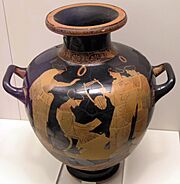
- Alcaeus (6th century BC), a Greek poet.
- Sappho, an ancient Greek poet. Plato called her "wise" and the "Tenth Muse."
- Pittacus (around 640–568 BC), one of the Seven Sages of Greece.
- Hellanicus (mid-5th century BC), a Greek historian.
- Theophrastus, an ancient Greek philosopher and student of Aristotle.
- Laomedon of Mytilene (4th BC), a general who served Alexander the Great.
- Chares (4th century BC), a Greek historian and chamberlain to Alexander the Great.
- Epicurus, a Greek philosopher.
- Crinagoras (70 BC-18 AD), a Greek poet and ambassador.
- Theophanes, a Greek statesman and close friend of Pompey the Great.
Medieval Times
- Santa Thomais (910–1030), a nun, helper of people, and healer.
- Christopher of Mytilene (11th century), a Greek poet.
Modern Times
- Hayreddin Barbarossa (1478–1546), an Ottoman admiral.
- Oruç Reis (1478–1518), an Ottoman leader.
- Theophilos Hatzimihail (around 1870–1934), a Greek painter.
- Stratis Myrivilis (1892–1969), a Greek writer.
- Odysseas Elytis (1911–1996), a Greek poet who won the Nobel Prize in 1979.
- Argyris Eftaliotis (1849–1923), a Greek writer.
- Fotis Kontoglou (1895–1965), a Greek writer and painter.
- Georgios Jakobides, a painter.
- Konstantinos Kenteris (born 1973), a Greek athlete.
- Tériade (1889–1983), a Greek art critic and publisher.
- Christos Touramanis, a particle physicist.
- Giorgos Manousos (born 1987), a football player.
- Praxitelis Vouros (born 1995), a football player.
- Michalis Pavlis (born 1989), a football player and coach.
- Anastasios Chatzigiovanis, a football player.
Sister Cities
Mytilene has "sister city" relationships with other cities around the world. This helps them share culture and ideas. Some of these cities include:
 Corfu, Greece
Corfu, Greece Kalamaria, Greece
Kalamaria, Greece Lamia, Greece
Lamia, Greece Preveza, Greece
Preveza, Greece Paphos, Cyprus
Paphos, Cyprus Portland, Maine, United States
Portland, Maine, United States Setouchi, Okayama Prefecture, Japan (since 1982)
Setouchi, Okayama Prefecture, Japan (since 1982) Brod, Bosnia and Herzegovina
Brod, Bosnia and Herzegovina
Consulates
Mytilene hosts consulates from different countries. A consulate is like a small office that helps citizens of that country who are visiting or living abroad. Currently, Mytilene hosts a consulate from:
Images for kids
See also
 In Spanish: Mitilene para niños
In Spanish: Mitilene para niños
 | Janet Taylor Pickett |
 | Synthia Saint James |
 | Howardena Pindell |
 | Faith Ringgold |


